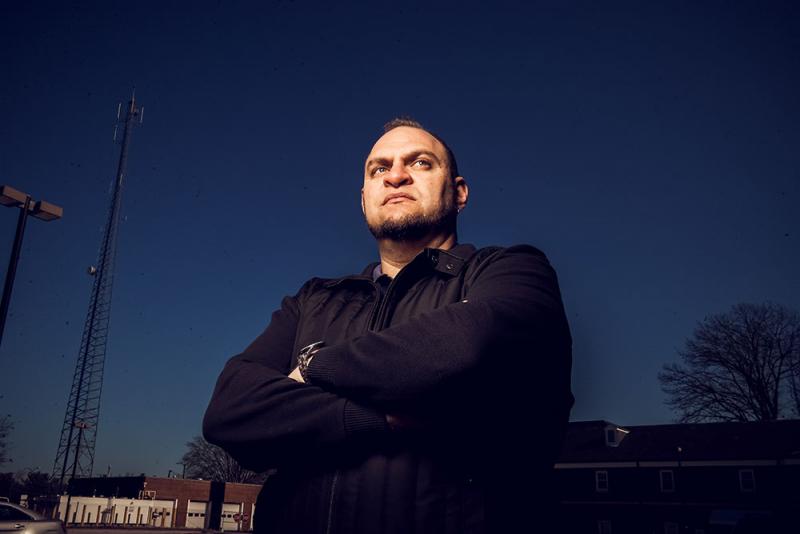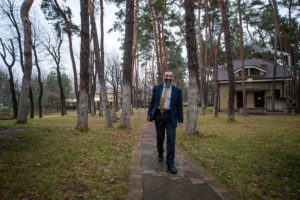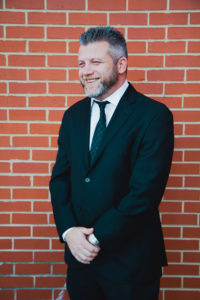
On Monday, Vladimir Besser flew from Baltimore to Poland with plans to cross the border to Ukraine and get his family to safety.
Besser is a member of the ARIEL Jewish Center — a community center and synagogue for Russian-speaking Jews — and he travels back and forth between Ukraine and the United States for work. Besser, who has a residence in Pikesville, owns a car parts export business with locations in Kyiv and Odessa.
When Russia invaded Ukraine last week, he was in Baltimore, while his wife and and 9-month-old son were in Ukraine. He contacted the embassies and the State Department to try to get them out, but to no avail. He then decided he needed to try to get them out himself.
After the invasion began, bombing at an Odessa army base blew out the windows of his business. He is concerned with parts of the city vacated from air raids that looting and unrest could occur.
On Feb. 23, “I was working on my laptop, and I started getting phone calls and I started looking at the news,” he said. “And I wouldn’t even imagine where we are. We’re in 21st century. How this could even happen? The country that’s not attacking anybody, for somebody to start sending bombs to our airports.
“We all thought they’re gonna take some of the region that they want on the Crimea, and it’s gonna be maybe over with,” he added. “We would never in our darkest, worst dreams thought it was possible they would be sending bombs right towards us.”
Russian forces invaded Ukraine from the north, east and south. And although news reports said that more than 190,000 troops, including Russians and Russian separatists, were deployed, Ukraine reportedly has 250,000 troops, but less sophisticated military equipment.
Besser is one of the many Jews with ties to both Ukraine and Baltimore.
“It’s a fight that’s really terrible. But this fight, let’s not call it a fair fight. It’s impossible fight,” Besser said. “It’s like somebody comes out trying to box in the ring with Mike Tyson.”
Nevertheless, Besser said the Ukrainian people are behind President Volodymyr Zelensky “150 percent.” Elected in a landslide in 2019, the former actor who played a president on TV told supporters “I will never let you down.” And now his mettle is being tested against an insatiable and ferocious adversary, Russian President Vladimir Putin, whose description of the invasion as a peacekeeping mission was universally recognized as ludicrous propaganda.
[Volodymyr Zelensky was a Jewish comedian. Now the world’s eyes are on him.]
“Ukrainians are trying to put up a fight. They do not want to be Russian,” Besser said. “They are taking matters in their own hands. They will not be welcoming Russia.”

Concern for Jewish communities
Rabbi Velvel Belinsky leads Baltimore’s ARIEL Jewish Center, where many community members are Russian and Ukrainian immigrants.
Belinsky was in Ukraine in December, invited to speak at the Women’s Stars Ukraine program for college students held in a suburb of Dnipro, Ukraine. At the time, he said the atmosphere was fairly optimistic.
“I was there when the whole situation just began escalating. And I saw the Jewish community there, and the sense was that everything’s gonna be fine. There’s not going to be any war. It’s all just political posturing,” said Belinsky, a native of St. Petersburg, Russia. “The people on the ground did not believe that there’s going to be any military operation, especially such a big one. So now, once it began, obviously, I am extremely concerned about the Jewish communities in those regions.
“A friend of mine from yeshiva is a Chabad rabbi in Sumy, right near border with Russia, in the northern part of Ukraine,” Belinsky added. “I had a brief communication via WhatsApp with him. It’s pretty scary.”
Belinsky agrees that the Ukrainian people are behind Zelensky.
“While I was there, I felt that people in Ukraine had a lot of faith in their president,” he said. “They were very satisfied with Zelensky.”

Family ties
In 1989, about two years before Ukraine’s independence, Gene Drubetskoy’s family fled Kyiv because of antisemitic attacks.
Drubetskoy was 8 at the time, but remembers clearly the family having to hide their Jewish identity, and not being able to freely practice their religion.
[Gene Drubetskoy’s journey for the American dream]
Now, he has about a dozen family members still living in Ukraine, while those that fled for the U.S. settled in Baltimore, New York and California.
On Friday, a day after Russia invaded, he was on the phone with his cousin who has taken to calling Putin “Putler,” an echo of the Nazi expansionism Hitler unleashed on Europe in 1939.
“Most of the Jews immigrated from Ukraine, either to Israel or to the States. And the ones that were behind, there’s not many,” he said. “Being Jews, we always stick together, we take care of each other and watch out for each other. Just like what’s going on right now. All I see are Jewish organizations calling for help raising money.”
Although he was following the Russian aggression in the news, he didn’t expect a full-scale invasion.
“It really hit me hard, because my family’s there,” he said.
So far, they are safe. Drubetskoy said family told him Kyiv is shut down, and everything is closed.
“They’re just sitting in their apartments, but places where they were closer to the attacks, they’re in bomb shelters,” he said.
Like many Ukrainians, Drubetskoy was pleased to see Zelensky elected, but for a more personal reason. “It was a proud moment when the country that had so much antisemitism finally elected a Jewish president,” he said.
Meanwhile, he said this invasion feels more like a civil war — pitting brother against brother — than an invasion from another country. As officials are urging Ukrainian citizens to arm themselves and asking able-bodied men to volunteer, Drubetskoy said his cousin remembers Putin calling Ukrainians his “brothers,” and many families there have intermarried with Russians.

Is freedom a place or an idea?
In 2007, Oleksandr Vainer — originally from a town in the Khmelnytskyi Region of Western Ukraine — and his wife moved to Kyiv. The couple had met in Moldova, where she was from and he was living for a time. They lived in Kyiv until 2015.
Vainer is co-owner of a few companies in Ukraine, including an agrodistribution company with a main office in Kyiv, and a dozen smaller offices in different regions.
Even though he and his family were living in Kyiv during Ukraine’s Revolution of Dignity of 2014, Vainer was hopeful that the Russian aggression toward Ukraine could be settled diplomatically, until recently.
“We are all optimistic by nature, all as mankind,” he said. “Two weeks ago, I felt the war could be real. I couldn’t imagine the scale.”
He and his wife are grateful their family is in the United States, but they worry about friends and colleagues, some of whom were lucky to escape Kyiv.
“Some of them are still there in Kyiv or suburbs, in Kharkiv and other cities under the bombs and missiles staying in shelters or basements,” he said.
Vainer would like people in the U.S. to understand how much freedom means to the Ukrainian people.
“Is freedom a place or an idea? Why Ukrainians can’t be free in their own land? Why can’t they decide on their own what to do, or where to go? Even if the way is wrong,” he said in an email. “Why should they move to another country to be free? Why should they go back to USSR if they don’t want to? What is russia (I can’t use a capital letter for the name of this country today) to tell Ukraine where to go?”
Aid for Ukrainian Jews
As for what people here in the U.S. can do as the crisis develops, Belinsky implored people to support the Jews of Ukraine by donating to organizations providing aid to the embattled country.
“JewsOfUkraine.com is a website that was just created jointly by the Jewish communities of Ukraine to help them in this situation,” he said. “It is a good place to donate. The funds are going directly to them, without intermediaries.
“So, anybody in a position of helping financially, or if people can help in any other way, they should because people it’s a great tragedy. People are suffering.”
On Thursday, the evening of the invasion, The Associated: Jewish Federation of Baltimore launched The Ukraine Emergency Fund supporting Odessa and communities in Ukraine suffering from the conflict.
“One hundred percent of the money raised from the Ukraine Emergency Fund will help support the on-the-ground work by The Associated’s overseas partners, the American Jewish Joint Distribution Committee (JDC), the Jewish Agency for Israel and World ORT. There are roughly 300,000 Jews in Ukraine and we serve 40,000 vulnerable elderly and families,” The Associated said in a statement.
“For those of us in Baltimore, this is a very difficult time as we worry about our friends and colleagues in Odessa,” said Beth H. Goldsmith, chair of The Associated’s board. “For the past 30 years, we have developed a longstanding relationship with the Jewish community through our Baltimore-Odessa Partnership, and we remain committed to their physical, emotional and financial safety.
“We have already seen the need for emergency assistance through dramatic inflation, causing increases in the cost of basic necessities, electricity and fuel,” she added. “As the conflict progresses, we recognize that there will be a number of humanitarian needs that will have to be addressed in the coming days. Working with our overseas partners, all money raised through this campaign will go toward supporting these emerging needs.”
Donations to the Ukraine Emergency Fund can be made at associated.org/Ukraine.







